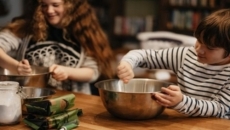Parents are the primary caregivers for their children. Among the various relationships that a person might have throughout their lifetime, the bond with their parents plays an important role in building the groundwork for the rest of their lives. Parenting involves a great deal of dedication, sacrifice, fortitude and patience. Because there is no perfect way to parent, many people make mistakes in some way. Rachna Muralidhar, Clinical Psychologist of Mpower Centre, Bengaluru, says parents need to be aware and conscious of their behaviours which can be toxic and impact their kids. She further discusses with IANSlife the toxic and non-toxic behaviour of parenting.
Toxic Behaviours Of Parents:
* Critical treatment: When a parent constantly criticises, over-corrects and tries to mould their child based on excessive expectations, the impact can be detrimental to the child's well-being. Self-doubt, lack of self-confidence and inability to draw boundaries are common tendencies in such children. The child feels inadequate since they could not match up to their parents' relentless demands.
* Uncontrolled emotions: Parents that are unable to self-regulate, for e.g. quick to show anger or prone to deep sadness, are unconsciously teaching the child about acceptable forms of behaviour. Extreme emotions are normalised in the child's mind which may cause them to adopt uncontrolled forms of behaviour, making it difficult for them to adapt to society.
* Oversharing: In a classic case of role reversal, the child is forced to adopt the role of the parent at an early age due to oversharing of emotions and responsibilities by parents. These situations push them to become problem solvers, negotiators and caregivers. Due to their people pleasing attitude and suppression of their own needs, they often find themselves in abusive situations as adults.
* Constant comparison: In Indian society, 'SharmajiKa Beta' is a common phenomenon. All of us have come across instances where parents relentlessly compare their child to someone else. It can be a sibling, cousin, neighbour or classmate. Self-doubt and dissatisfaction are common in such children, as they are never made to feel worthy.
* Breach of trust: When parents cross boundaries and spy on their children, major trust issues are created. Checking a child's mobile phone, reading their diaries and revealing secrets are instances of a serious breach of trust. These children either grow up to be rebellious or may be prone to bullying even later in life.
Challenging Situations Parents Face: Non-Toxic Ways To Deal With It
* Peer pressure: Often when parents come across unhealthy behaviours, they tend to overreact. Other times when children try to tell parents about their issues, they may not be taken seriously. Judging, punishing and 'I told you so' behaviour only pushes children away. Parents should create a safe space for children and listen without judgement. When parents are calm and empathetic, it helps children communicate with little hesitation. Share a set of rules and consequences, assisting children to understand unacceptable behaviours while retaining trust.
* Addiction to gadgets/mobiles: In this digital age, addiction to mobiles has become a common phenomenon. Understandably parents are worried about its implications. However, resorting to threats and punishments will not do much good. Parents are advised to keep a consistent approach toward discipline. Children often get addicted to gadgets when they want to forget about the world around them. If a child is going through pivotal transitions or difficult experiences, connect and help them deal with the situation.
* Working parents: Children need love, safety and guidance to grow up to be healthy adults. Common toxic behaviours associated with working parents include lack of connection with their kids, temper and absence of affection. Parents should look at investing quality time to build meaningful connections with their children. Encourage children to communicate and share their feelings. Consistent show of affection while disciplining by setting boundaries helps children understand expectations and feel loved at the same time.
Parenting can be an uphill task. There is no bible or perfect manual or training course which can make a parent perfect. Being conscious, kind, dependable and consistent are qualities a parent should imbibe to ensure their children get a healthy childhood.
Photo courtesy of IStock.






